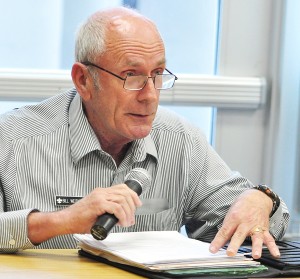Surprising revelations suggest city has few plans to repair, replace old sewers
COLUMBIA, Mo 11/2/13 (Beat Byte) -- The fine print in a $32.3 million sewer bond ballot contains a sizeable handout for new development on the outskirts of town. Coupled with surprising revelations city leaders may have few plans to repair and replace old sewers, developers may be the big winners after Tuesday's vote.
The bond money will be used for "expanding and extending" city sewers, the ballot explains.Voter approval will also authorize the city to collect whatever rates and fees are necessary to build, operate, and maintain "extensions thereto hereafter constructed or acquired by the City," which would include any annexations from the county.News stories about the bond have downplayed new construction, instead playing up well-worn promises to repair and replace existing sewer lines, especially in older parts of Columbia. As it did in 2008, the bond language provides for that work, too.
But actions -- or in this case, inactions -- speak louder than words.A conversation between Council members Barbara Hoppe, Ian Thomas, and city manager Mike Matthes last week suggests city leaders have spent almost no time planning to repair and replace old sewer lines.Albeit late in the process, the two Council members have been researching what Thomas calls "credible questions" about the bond proposal raised by retired city sewer superintendent Bill Weitkemper.
Mr. Thomas and Ms. Hoppe asked Matthes to provide data he is supposed to have backing up a study of how cracked and broken sewer lines let stormwater get into the system -- a so-called "inflow and infiltration" or I & I study.The data should support use of bond funds on methods to repair the bad lines Matthes claims were successful in Columbia.
But instead of providing the data, Matthes gave the Council members one page from a 2006 study of Springfield, Missouri's sewers, scrawled with handwritten notes.
"This almost left me speechless!" Weitkemper told the City Council and reporters, after learning Matthes was using 7-year-old data from another city to support the Columbia bond. "I just do not feel that data from Springfield proves that I & I reduction efforts in Columbia have been effective."Mr. Thomas could not explain how the Springfield study was relevant to Columbia, but he did say he was "pursuing a scientific basis for the interventions we will conduct."If voters approve the bond, sewer rates will rise roughly 13%.
Sidebar
Mobile Menu

 The Columbia Heart Beat
COLUMBIA, MISSOURI'S ALL-DIGITAL, ALTERNATIVE NEWS SOURCE
The Columbia Heart Beat
COLUMBIA, MISSOURI'S ALL-DIGITAL, ALTERNATIVE NEWS SOURCE

03
Tue, Mar
